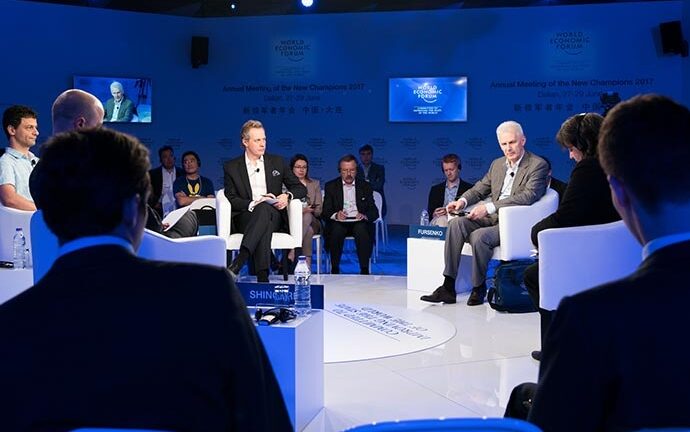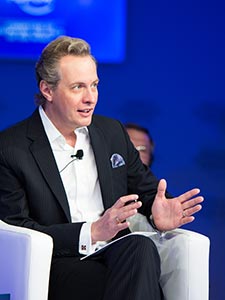
Valery Fokin represents USC at World Economic Forum annual meeting in China
Science, like the arts, continues to defy political boundaries.
While rising tensions between the U.S. and Russia are straining political relations, scientists in both countries continue to find common ground.
“In today’s world, science is global and international by definition, not only because scientists are exchanging ideas, but because we are facing the same problems … energy, pollution, the food supply,” said Valery Fokin, professor of chemistry at USC Dornsife. “These are global problems we are trying to address in all countries, and in different ways.”

Valery Fokin talked about the need for scientists across the world to work together to drive scientific innovation and ensure human security.
Fokin made his remarks as one of four panelists in a session titled “Global Science: The View from Russia” at the World Economic Forum’s 11th Annual Meeting of the New Champions. Other panelists included Anton Shingarev, Artem R. Oganov, and Andrei Fursenko. Editor-in-Chief of Scientific American Mariette DiChristina moderated.
Held June 27–29 in Dalian, China, the high-profile gathering brought together more than 2,000 prominent leaders from politics, business, civil society, academe and the arts to address the global challenges of today — economic, political, societal and environmental.
The panel centered on how Russian science is poised to drive global innovation following extensive reforms that began in 2010. In addition to committing significant funds to renovating the country’s research infrastructure, the Russian government established programs aimed at attracting educators and scientists from around the world to open new laboratories and research centers in Russia to train a new generation of world caliber researchers, according to Fokin.
Fokin also participated in sessions centered on fulfilling the pressing need for rapid and effective tests for tuberculosis in the developing world, addressing the rise of antibiotic resistant bacteria and ensuring global scientific cooperation progresses despite rising nationalism.
Arriving in the United States from Russia in 1992 to study, Fokin earned his Ph.D. at USC Dornsife in 1998. He is now a researcher at the Bridge Institute at the USC Michelson Center for Convergent Bioscience. He spoke about the critical importance of enabling the convergence of the sciences as well as the convergence of humanity.
“We’re in the age of human identity and security …, where we need to work together,” he said. “And in today’s world it’s much easier to collaborate; it’s easier to communicate.”
Fokin also stressed a need for scientists to better communicate to the general public in order to encourage support and funding for research.
“Science is an inherently globalized endeavor,” he said, “and as practicing scientists, whether in the academy or in industry, we need to be able to communicate what we do, why we do it and what it means to be a scientist at large in today’s world, when the very concept of globalization is being questioned and often opposed.”